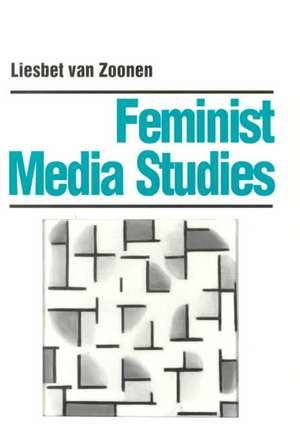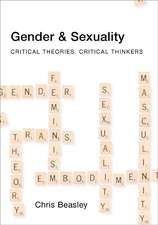Feminist Media Studies: Media Culture & Society series
Autor Liesbet van Zoonenen Limba Engleză Paperback – 4 mai 1994
Preț: 378.39 lei
Nou
Puncte Express: 568
Preț estimativ în valută:
72.43€ • 78.70$ • 60.88£
72.43€ • 78.70$ • 60.88£
Carte disponibilă
Livrare economică 31 martie-14 aprilie
Livrare express 14-20 martie pentru 29.55 lei
Preluare comenzi: 021 569.72.76
Specificații
ISBN-13: 9780803985544
ISBN-10: 0803985541
Pagini: 208
Ilustrații: 1, black & white illustrations
Dimensiuni: 156 x 234 x 13 mm
Greutate: 0.37 kg
Ediția:1
Editura: SAGE Publications
Colecția Sage Publications Ltd
Seria Media Culture & Society series
Locul publicării:London, United Kingdom
ISBN-10: 0803985541
Pagini: 208
Ilustrații: 1, black & white illustrations
Dimensiuni: 156 x 234 x 13 mm
Greutate: 0.37 kg
Ediția:1
Editura: SAGE Publications
Colecția Sage Publications Ltd
Seria Media Culture & Society series
Locul publicării:London, United Kingdom
Recenzii
`An invaluable tour d'horizon of feminist media theory and research, this book will also be essential reading for anyone interested in the many diverse strands of feminist media politics today. Liesbet van Zoonen successfully maps the contours of a now vast terrain, reflecting its tremendous heterogeneity and providing a thoughtful appraisal of current theoretical positions within it' - Margaret Gallagher, Media Consultant
`At last we have a cogent and accessible synthesis of feminist work on the media. That would have been contribution enough, but van Zoonen's book goes beyond a synthesis to a sophisticated yet sympathetic critique of various feminist approaches to studying the media, using her own original analysis of media content and production to fill in where work is undeveloped or absent. The reader - whether new to the subject or a seasoned feminist scholar - will find the book useful and provocative. The book lays the foundation for understanding the value of a poststructuralist turn in feminist media studies but without condemning the usefulness of other feminist projects and without theoretical jargon. van Zoonen presents the best explanation of some phenomena - such as the reason that the 'male gaze' is not simply reversed when women look at pictures of men's bodies - that I have read. It's all here in one place. van Zoonen deserves our thanks' - Lana Rakow, University of Wisconsin-Parkside
`Although, as van Zoonen notes, the media have played a central role in feminist critique, questions of gender are scarce in the mass communication literature and feminist media studies remain marginalized. Here is a strong effort to remedy the situation' - Choice
`Liesbet van Zoonen has succeeded in exhibiting the unappreciated diversity of feminist media theorising and has prepared the ground for demonstrating its continuing relevance to newly emerging and diverse media genres. Her interesting and insightful work will be greatly welcomed by researchers, students and teachers both in women's studies and media and communication departments. I suspect that a straightforward feminist voice is what those interested would most welcome' - Sociology
`Van Zoonen offers a provocative vision for the future of the field, and provides us with an important contribution to the literature of mass communication' - Journalism & Mass Communication Quarterly
`At last we have a cogent and accessible synthesis of feminist work on the media. That would have been contribution enough, but van Zoonen's book goes beyond a synthesis to a sophisticated yet sympathetic critique of various feminist approaches to studying the media, using her own original analysis of media content and production to fill in where work is undeveloped or absent. The reader - whether new to the subject or a seasoned feminist scholar - will find the book useful and provocative. The book lays the foundation for understanding the value of a poststructuralist turn in feminist media studies but without condemning the usefulness of other feminist projects and without theoretical jargon. van Zoonen presents the best explanation of some phenomena - such as the reason that the 'male gaze' is not simply reversed when women look at pictures of men's bodies - that I have read. It's all here in one place. van Zoonen deserves our thanks' - Lana Rakow, University of Wisconsin-Parkside
`Although, as van Zoonen notes, the media have played a central role in feminist critique, questions of gender are scarce in the mass communication literature and feminist media studies remain marginalized. Here is a strong effort to remedy the situation' - Choice
`Liesbet van Zoonen has succeeded in exhibiting the unappreciated diversity of feminist media theorising and has prepared the ground for demonstrating its continuing relevance to newly emerging and diverse media genres. Her interesting and insightful work will be greatly welcomed by researchers, students and teachers both in women's studies and media and communication departments. I suspect that a straightforward feminist voice is what those interested would most welcome' - Sociology
`Van Zoonen offers a provocative vision for the future of the field, and provides us with an important contribution to the literature of mass communication' - Journalism & Mass Communication Quarterly
Cuprins
Introduction
'New' Themes
A 'New' Paradigm
Media Production and the Encoding of Gender
Media Texts and Gender
Spectatorship and the Gaze
Gender and Media Reception
Research Methods
'New' Themes
A 'New' Paradigm
Media Production and the Encoding of Gender
Media Texts and Gender
Spectatorship and the Gaze
Gender and Media Reception
Research Methods
Notă biografică
Liesbet van Zoonen is Professor of Communication and Media Studies at Loughborough University and Professor of Popular Culture at Erasmus University Rotterdam. Her work covers the articulation of popular culture and politics, for which she uses a wide range of standard and creative quantitative and qualitative methodologies.
Descriere
`Van Zoonen offers a provocative vision for the future of the field, and provides us with an important contribution to the literature of mass communication' - Journalism & Mass Communication Quarterly






















